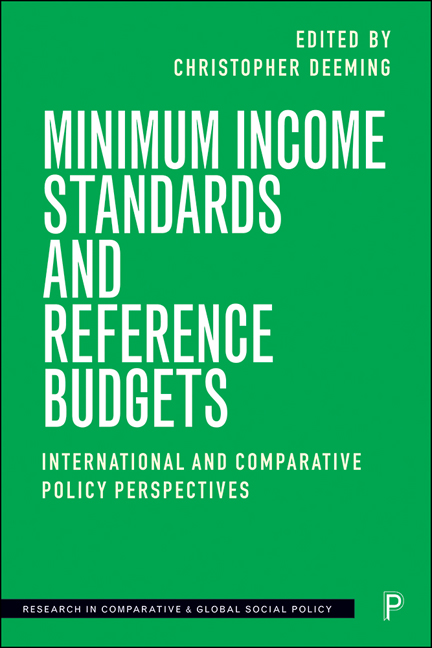11 - Estimating the Cost of Raising a Child in Catalonia Through the Reference Budgets Approach
Published online by Cambridge University Press: 12 March 2021
Summary
Introduction
In this chapter we exploit the references budgets (RBs) approach to calculate the cost of raising a child in Catalonia in densely populated areas, taking Barcelona as the reference city. RBs illustrate priced baskets of goods and services that represent the minimum resources needed for an adequate social participation. Adequate participation is defined as the ability of people to fulfil the various social roles they play as members of society (Storms et al, 2013).
The chapter is structured as follows. First, we describe the theoretical framework and methods used to estimate the minimum resources needed for adequate social participation. Second, we present the total budget for various family types and children costs, as well as the validation of its content through focus groups. Third, the figures obtained are discussed in relation to the Catalan institutional context in order to explore how RBs could be used to monitor social policy. Finally, some limitations and future lines of research are proposed.
Theoretical framework and method
RBs have been developed in different countries using various methods throught the 20th century. However, there is little research in this field in Spain. To the best of our knowledge, only one study was conducted by ADICAE1 in 2009 based mainly on household expenditure surveys, using expert advice and focus group discussions (Warnaar and Luten, 2009).
In 2012, the ImPRovE project set the challenge of developing RBs using a common theoretical and methodological framework for six large European cities: Antwerp, Athens, Barcelona, Budapest, Helsinki and Milan. This study is the first step towards exploring the possibility of creating a new indicator to contextualise poverty and guide social policies in Europe (see Chapter 18). Additionally, this has been an opportunity to promote this approach in our country.
How have we built the baskets of goods and services?
First, the standard of living used to calculate the RBs responds to the minimum resources necessary to develop the social roles.
Second, to establish an acceptable standard of living we adapted Doyal and Gough's (1991) theory of human needs to the European context. These authors identify two universal ‘basic needs’ common to all cultures: physical health and autonomy. The concept of ‘intermediate needs’ is developed to satisfy these universal principals.
- Type
- Chapter
- Information
- Minimum Income Standards and Reference BudgetsInternational and Comparative Policy Perspectives, pp. 155 - 168Publisher: Bristol University PressPrint publication year: 2020



